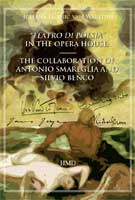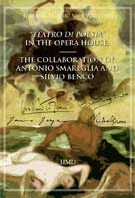Juliana Ličinić van Walstijn
„Teatro di poesia“ in the Opera House: The Collaboration of Antonio Smareglia and Silvio Benco
Muzikologija bez granica, br. 1
Hrvatsko muzikološko društvo / Croatian Musicological Society, 2009.
376 str.

Bilješka o knjizi
„Teatro di poesia“ in the Opera House: The Collaboration of Antonio Smareglia and Silvio Benco
Smareglia!? Who was he? The undeserved oblivion fallen on Antonio Smareglia (1854-1929) has, for a long time, confined this composer to being a typical subject for academic research and learned studies with little or no consequence on the actual revival of his music in opera houses or concert halls. Yet, his works bear the imprint of a strong personality, his style being an intriguing blend of three musical traditions: Italian, German and Slav.
A contemporary of Puccini, Smareglia was occasionally associated with Verismo on account of his Nozze Istriane (1895) to a libretto by Illica, but his artistic sensibility was alien to that genre no less than to Puccinian-like subjects. Ultimately, Smareglia’s most distinctive operas – La Falena, Oceana, Abisso – are rather akin to symbolist and decadent music theatre as they display fantastic plots, atmospheric settings and large symphonic movements. Of the three operas, Oceana can perhaps best exemplify the nature of Smareglia’s inspiration as an artist born by the sea (the Istrian coast of the Adriatic) writing about the sea. Successfully premiered at La Scala under Toscanini in 1903, the opera has a haunting sirens’ chorus and pervasive sea music which sets the pace of the action in an unbroken spell of dreamlike visions.
This study of the three operas results from the earnest commitment and genuine passion of Juliana Ličinić van Walstijn, herself a native of Pola (Istria) like Smareglia. She explores the cultural background in which the composer grew up and worked, and focuses on his fruitful collaboration with the Triestine novelist and critic Silvio Benco which led to the creation of a teatro di poesia with a strong emphasis on the musical components over the dramatic development of the action. In this study, the cultural climate of European Symbolism and Decadence is clearly related to the genesis of Smareglia and Benco’s allusive and purely musical works, and references to D’Annunzio’s art or Arnold Böcklin’s sea paintings foster a full appreciation of the operas. Adequate space (the first three chapters) is given to a wealth of informative material on Smareglia and Benco. La Falena, Oceana and Abisso are then examined and discussed in great detail both in terms of musical analysis and with regard to the libretto and sources of each opera.
Juliana Ličinić van Walstijn argues convincingly in favour of Smareglia’s originality and sustains her views with exhaustive musical examples and excerpts from the critical literature on the reception of that music. Her work proves an illuminating and useful reading.
Indeed, this book points to a further target that is unfortunately beyond the author’s personal reach. It makes a strong claim for the revival of Smareglia’s operas and it can only be hoped that Oceana or any other of his works may soon be put to the test in an opera house and prove their worth.
(Matteo Sansone)
***
“Teatro di poesia” u operi: suradnja Antonija Smareglie i Silvia Benca
Ovo djelo pokušava pokazati mjesto Antonia Smareglie u talijanskoj operi na prijelazu iz 19. u 20. stoljeće uz pomoć istraživanja posljednjih triju Smarglijinih opera. Ispitivanje neobičnih tema i jedinstvene atmosfere opera Falena, Oceana i Abisso pokazuje njihovu izvanrednu originalnost i sugerira da pripadaju „poetskom teatru“ stvorenom skladatelja u suradnji sa Silviom Bencom.
Ova studija istražuje kulturnu pozadinu u kojoj je Smareglia djelovao. S obzirom da su i Smareglia i Benco većim dijelom pali u međuvremenu u zaborav, i jedva da ih se spominje u povijesti opere, prva tri poglavlja služe da uvedu dva umjetnika i odrede opseg materijala kojim se bavi ova studija. Glavno žarište knjige pružaju tri opere. Istraživanje njihovih osebujnih i inovativnih zapleta pokazuje da je Smareglijinu muzikalnost stimulirao književni ukus njegova libretista. Nadalje, na usporedbi s djelom njegova bolje poznatoga suvremenika Giacoma Puccinija pokazuje se kako se u svojoj reakciji na Bencove „nedramatičke“ priče i ozračja Smareglia odmaknuo od ukusa i mode u talijanskoj operi svojega doba. Stil Bencovih libreta i Smareglijina glazbenog idioma pokazuje kako su oba umjetnika dala prednost glazbenim aspektima pred dramatskim, s jasnom odlučnošću da stvore novi stil u operi. Prožeti klimom simbolizma i dekadentnosti bili su na najboljem putu da stvore ono što se naziva „teatro di poesia“ („kazalište pjesništva).
Istraživanje nastoji pokazati koliko je vrijedan Smareglijin doprinos opernom repertoaru. Njegove opere Falena, Oceana i Abisso originalnije su i maštovitije od većine opera napisanih od strane njegovih talijanskih suvremenika.
Bilješka o autoru
Juliana Ličinić van Walstijn graduated in Musicology, Music Publishing and Music Education at the University of Zagreb Music Academy. Since then she has been involved in administering piano competitions, organising and participating at conferences, employed in library work and academic teaching. Her many years of research of Italian opera at turn of the 19th and 20th centuries, in particular of the composer Antonio Smareglia, led her to write a doctoral thesis. She was awarded a PhD in Music at the University of Edinburgh in 2002, having worked with David Kimbell and Raymond Monelle as her mentors.
Julijana’s interests continue to involve musicology, music teaching and arts administration. Recently she has taken her enthusiasm for this composer and his work to a number of other European cities, including Belfast, where she works at Queen’s University Belfast, Centre for Excellence in the Creative and Performing Arts: An Interdisciplinary Arts Programme.
2009.
ISBN 978-953-6090-33-4
150,00 kn + poštarina
US$ 36.00 / Euro 25.00 + postage

